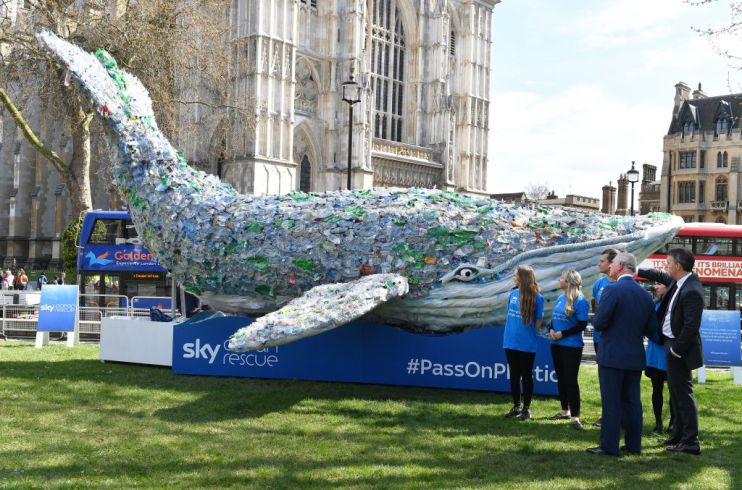Thames have changed: CEOs going green will reap the benefits

WHEN Paul Polman drank a glass of water drawn from the murky River Thames a decade ago the Dutchman could hardly have imagined how many of his peers would follow suit.
Not by matching his dubious consumption, but by attempting to generate more from the companies they run than profit alone.
Polman’s stunt took place in November 2010 at the launch of Unilever’s Sustainable Living Plan (SLP), a bold effort to prove that corporate growth didn’t need to come at the expense of people or the planet.
Read more: Chancellor Rishi Sunak: The City could be set for a post-Brexit Big Bang 2.0
He remained chief executive of the maker of Lipton tea, Ben & Jerry’s ice cream and Knorr soup until the end of 2018 and survived the experience that day in part because the river water had been treated with the company’s own purifying system Pureit.
The plan’s publication was a defining moment when profit met purpose in a way that many CEOs had never countenanced before.
Several of Polman’s contemporaries wondered privately if he was confusing shareholders’ number one mission with unnecessary do-gooding. Like a mouthful of the Thames, some investors found it hard to swallow.
Yet a decade on, as the environmental, social and governance (ESG) movement gathers pace, the annual financial return is just one cause among many for leaders to get behind as they consider the broad stakeholder palette of customers, staff, suppliers, investors and the wider world. Just like Polman, every CEO must be a campaigner now.
The most effective boardroom campaigners have the confidence to stick their neck out and use their company as a platform from which to project a vision of equality, diversity or a greener world.
They may risk their reputation speaking passionately for a cause, often committing shareholder funds to good deeds too. Some believe they are visionaries; others are far humbler. But none should be mistaken for Greta Thunberg in pinstripes. They most often pick causes with enlightened self-interest: something that is good for business and beyond – and, cynically, perhaps also themselves.
Think Ajay Banga at Mastercard, who set aside $500m for his financial inclusion campaign to recruit 500m – now one billion – of the world’s unbanked to the global, digital money system.
If more CEOs had spoken out sooner against Brexit in 2016 – and with the passion of JD Wetherspoon’s arch Leaver Tim Martin – the UK might not have departed the European Union.
Sometimes the campaign is self-selecting.
In February last year, Bernard Looney, the incoming chief executive of BP, set a target to reduce the oil firm’s carbon footprint to net zero by 2050 – seemingly before he had a fully-fledged corporate strategy to get there. But with $47bn of net inflows into ESG funds in November according to Morningstar data – four times the 2019 average – it is clear that financial imperative has caught up with social mission.
As activist investors crowd onto the share registers of lazily-run companies, the idea of the “activist CEO” has been embraced by, among others, Salesforce founder Marc Benioff in his book Trailblazer.
What is notable is that Polman the campaigning pioneer failed in several departments, and not just with defeated efforts to replace Unilever’s dual shareholder structure with a single legal entity and primary share listing in Rotterdam.
His blueprint, aligned to many of the United Nations’ sustainable development goals, undertook to improve the health and hygiene of more than a billion people within a decade. In the event, progress by 2019 showed Unilever – now run by Alan Jope – reached 1.3bn people, helping to reduce diarrhoea through increased handwashing among other initiatives.
But the aim of halving consumer water use associated with its products fell a long way short and has actually risen by 1pc since 2010. As long ago as its 2015 update, the company pushed out by a decade its target of halving the greenhouse gas impact of its products across their lifecycle. Nor did it manage to double group sales, the eye-catching pledge put out in tandem to appease out-and-out capitalists.
Should it matter? Some instances of corporate failure beyond the profit and loss account matter more than ever. Witness the exit of Jean-Sébastien Jacques from the helm of Rio Tinto, following the miner’s decision to blow up some 46,000-year-old Australian rock shelters. Heads must roll if corporations fail the citizenry test so spectacularly.
Yet the corporate campaigner’s pledges to make the world a better place appear less risky endeavours. Investors might frown if they fall short, but the ESG movement is not yet sufficiently powerful to do more than applaud the triers.
Now Jope is at it, last week setting his own targets for Unilever including ensuring that everyone who directly provides goods and services to the group earns at least a living wage by 2030 and equipping 10m young people with essential job skills over the same timeframe.
These campaigners don’t set out to fail.
But beyond the financials, it is no cop-out to say that setting ambitious targets remains more important than actually meeting them – if others are inspired to follow.
Not to try these days is to ignore the looming climate emergency and social divisions widened by the Covid-19 pandemic. Not to try can devastate credibility, with staff and other stakeholders. For business leaders still lacking that campaigning spirit, promising the earth would be a start.

James Ashton’s book The Nine Types of Leader is published by Kogan Page.